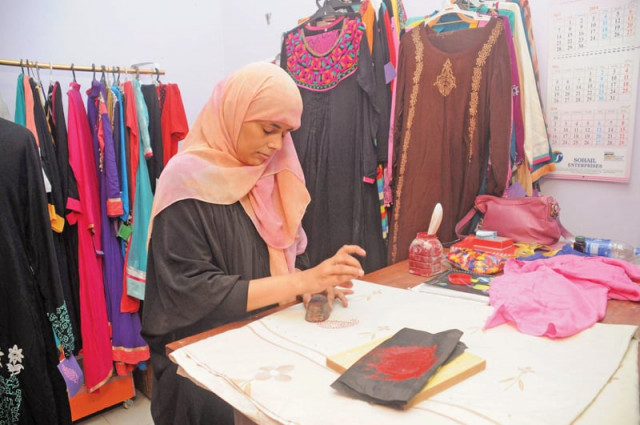Textile printing: Female entrepreneur finds place in shrinking market
Nehal gradually builds her manual block-printing business with own resources.

Apart from some big businesswomen, many female entrepreneurs are doing business on a small scale and making a healthy contribution to easing poverty and unemployment levels in the country as well as boosting overall economy.
Mona Nehal is one such entrepreneur who first transformed her interest in an area into a skill and then kicked off business with thin funds.
Before embarking on her work life, Nehal first took training in some courses where she found interest in block-printing on clothes and chose it as her profession.
“Though demand for block-designing has waned in recent times with the overwhelming popularity of printed lawns, still many women like to have their clothes printed with manual designs like printing of borders, flowers and other such work,” she said.
Besides the time taken to prepare a wooden block, block-printing a ladies shirt takes two to three hours. Many women want to have the design printed of their choice and very few agree on printing from the already prepared blocks.
Nehal started printing designs on clothes from her home in 2003 when she produced her work on three women suits at a cost of Rs3,000. Initially, shopkeepers and boutique owners unnecessarily pointed to some flaws in her work, but she, encouraged by her husband, a mechanical engineer in a textile factory, and her mother-in-law, did not give up.
“My first success came when I sold a white and green suit for Rs1,200 that brought me a profit of Rs300 to Rs400,” she said.
However, Nehal needed financing to expand the business which she wanted to arrange from her own resources. To achieve that, she worked for one and a half years at a popular boutique in the city and got Rs5,000 in weekly income. She then quit the job and the amount saved from the earnings was used to give a push to her business.
The next challenge was the marketing of suits, for which different types of exhibitions held in the city were a better avenue.
“Finding space for setting up a stall in these fairs where the fee is quite high was not an easy task for small entrepreneurs despite claims of government and private-sector institutions that businesswomen would be facilitated and offered a discount,” she said. To cope with the problem, Nehal in collaboration with two or three female entrepreneurs booked a stall in an exhibition and distributed the cost of stall among themselves. On this stall, she displayed her printed clothes while other women exhibited hand-made jewellery, decorative flowers and other handicrafts.
Her business expanded when she established contacts with boutique owners after participating in an exhibition in Lahore and then rented a place in a commercial area. At present, she has a team of up to 10 workers who stitch clothes, make block-printing and do other work.
Separately, women of mostly lower class lift Nehal’s printed suits with some initial payment for sale to their relatives, friends and neighbours and then pay the remaining amount. “Our main customers are working women, both belonging to the middle and upper classes,” she said.
In the end, Nehal said she was planning to further expand her business by bringing into its fold the women who were facing financial difficulties. However, she criticised some big businesswomen and some others who run NGOs for exploiting skilled small entrepreneurs. “They purchase our products at low prices and sell them at very high rates with their brand tags.”
Published in The Express Tribune, July 28th, 2014.
Like Business on Facebook, follow @TribuneBiz on Twitter to stay informed and join in the conversation.



















COMMENTS
Comments are moderated and generally will be posted if they are on-topic and not abusive.
For more information, please see our Comments FAQ